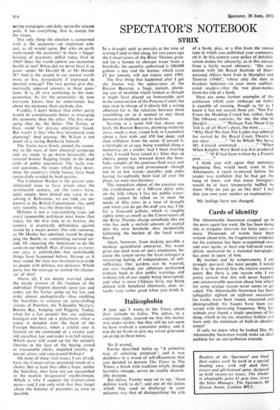SPECTATOR'S NOTEBOOK
STRIX
In a drought such as prevails at the time of writing I tend to feel smug, for two years ago the Conservators of the River Thames gran- ted me a licence to abstract water from a borehole; the quantity authorised is 180,000 gallons a day and the licence, which costs £5 per annum, will not expire until 1983.
The first thing that happened after I got the licence was the appearance of the Ruston Bucyrus, a huge, - patient, plonk- ing sort of machine which looked as though it might have played an honourable part in the construction of the Panama Canal; the nice man in charge of it clearly felt a strong affection for it, the relations between them resembling (or so it seemed to me) those between an elephant and its mahout.
Starting at a point 410 feet above sea- level, the Ruston Bucyrus, plonking tirelessly away, made a neat, round hole in Loamshire about a foot wide and 450 feet deep, and then withdrew from the scene. (I passed it, a fortnight or so ago, being trundled along a motorway on a trailer; had I been wearing a hat, I would have raised it.) After that an electric pump was lowered down the bore- hole; samples of the precious fluid were sent away for testing and pronounced—though not in so few words—potable; and, pipes having far-sightedly been laid all over the place, we went into business.
The immediate object of the exercise was the establishment of a 500-cow dairy unit; on the hills where I live the public water- supply cannot be relied on to meet the needs of fifty cows in a time of drought and when you do get the stuff you pay 3/4d. for a thousand gallons, which is roughly eighty times as much as the Conservators of the River Thames charge somebody like me who has sunk a certain amount of capital into his own borehole, thus incidentally lightening the burden of the local water board.
Apart, however, from making possible a madcap agricultural enterprise, this water gives one (and most of one's employees, be- cause the system serves the farm cottages) a reassuring feeling of independence, of self- sufficiency. Our gardens can be watered, our cars washed, our ablutions performed without heed to dire public warnings and without risk of our supply being interrupted; and what is more Château Strix, not being diluted with beneficial chemicals, does ac- tually taste rather good when you drink it.
Italicophobia
A year ago I wrote to the Times about their attitude to italics. The editor, in a courteous reply, assured me that this matter was under review, but they still do not seem to have evolved a consistent policy, and it can do no harm to give my trivial grievance an airing in these notes.
Sir [I wrote],
Fowler described italics as "A primitive way of soliciting attention"; and it was doubtless in a mood of self-effacement that you decided to demote The Times to The Times, a break with tradition which, though harmless enough, serves no readily discern- ible purpose.
But italics, Fowler went on to say, "have definite work to do"; and one of the duties which they used to discharge in your columns was that of distinguishing the title of a book, play, or a film from the roman type in which you published your comments on it. In this context your policy of deitalici- sation makes for obscurity, as in this extract from a fairly recent obituary: "His con- nexion with the Royal Institute of Inter- national Affairs bore fruit in Shanghai and Tientsin (1940)", where only the date in brackets indicates—to your more sophisti- cated readers—that the two place-names form the title of a book.
Here are some further examples of the confusion which your embargo on italics is capable of causing, though as far as I know it has not caused them yet: "Not Far From the Madding Crowd but, rather, Jude The Obscure contains, for me, the clue to Hardy's " "Perhaps You Never Can Tell is, of all Shaw's plays, the most "Why Shall We Join The Ladies was selected for revival by the Royal Court Theatre is not clear " "In In Which We Serve Mr. Coward attempted " "When When Knights Were Bold wa) first produced " "If If had been written by a French poet I think you will agree that sentences beginning thus would need, even in the Athenaeum, a rapid re-perusal before the reader was confident that he had got the hang of them, and that many foreigners would be at least temporarily baffled by them. Why do you go on like this? I feel that you owe your readers an explanation.'
My feelings have not changed.
Cards of identity
The Abominable Snowman cropped up in the news again last week. He has been doing this at irregular intervals for forty years or more. Thousands of words have been written about him, the fragmentary evidence for his existence has been re-examined over and over again; at least one full-scale expe- dition, sponsored by a national newspaper, has gone in quest of him.
By instinct and by temperament, I am strongly pro-yell; like most people, I would like it to be proved that the elusive creature exists. But there is one reason why I am pretty certain that this will never happen, one unanswerable question about him which for some strange reason never seems to get asked. The Abominable Snowman has been (allegedly) sighted on eighteen occasions; his tracks have been found, measured and photographed; his haunts have been tra- versed with increasing frequency. Why has nobody ever found a single specimen of his dung, which in his icy, insectless habitat can have only the mihimum of built-in obsoles- cence?
If only we knew what he looked like, the Abominable Snowman would make an ideal emblem for an anti-pollution crusade.


































 Previous page
Previous page